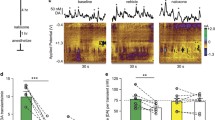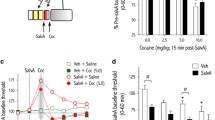Abstract
Microdialysis was used to investigate the effects of heroin administration on extracellular opioid peptide levels in the globus pallidus/ventral pallidum of freely moving rats. Two injections of heroin (0.6 mg/ kg IP) were given 3 h apart. The first injection had no significant effect on opioid peptide levels, but the second injection produced a transient yet significant increase (+268%) in opioid peptide-like immunoreactivity in pallidal dialysates, peaking 1 h after injection. This effect was blocked by administration of naloxone (3 mg/kg IP) prior to the second injection. The implications of these data are discussed with regards to the role of the endogenous opioid peptide system in opiate reward.
Similar content being viewed by others
Author information
Authors and Affiliations
Additional information
Received: 6 October 1997/Final version: 2 March 1998
Rights and permissions
About this article
Cite this article
Olive, M., Maidment, N. Repeated heroin administration increases extracellular opioid peptide-like immunoreactivity in the globus pallidus/ventral pallidum of freely moving rats. Psychopharmacology 139, 251–254 (1998). https://doi.org/10.1007/s002130050712
Issue Date:
DOI: https://doi.org/10.1007/s002130050712




